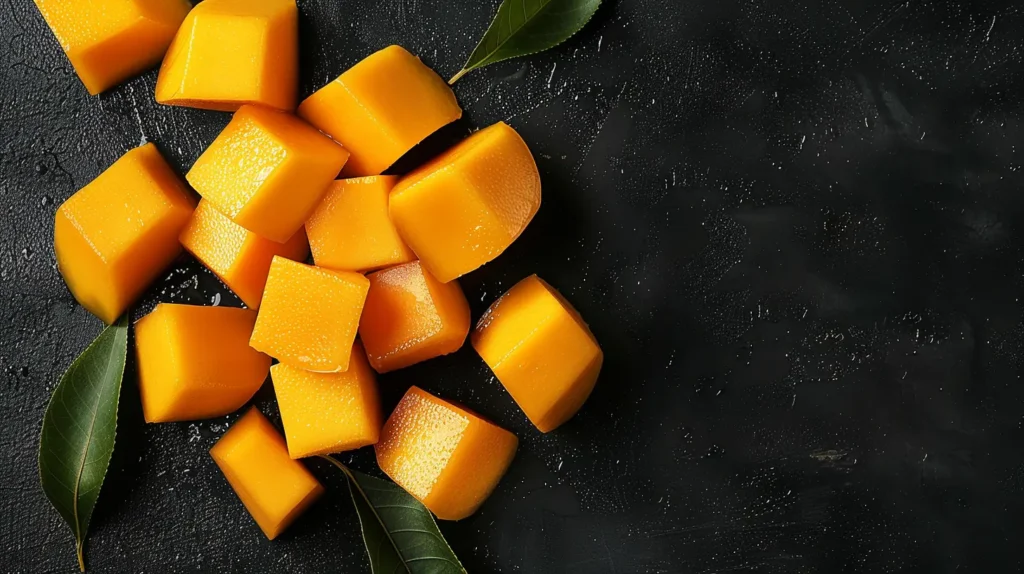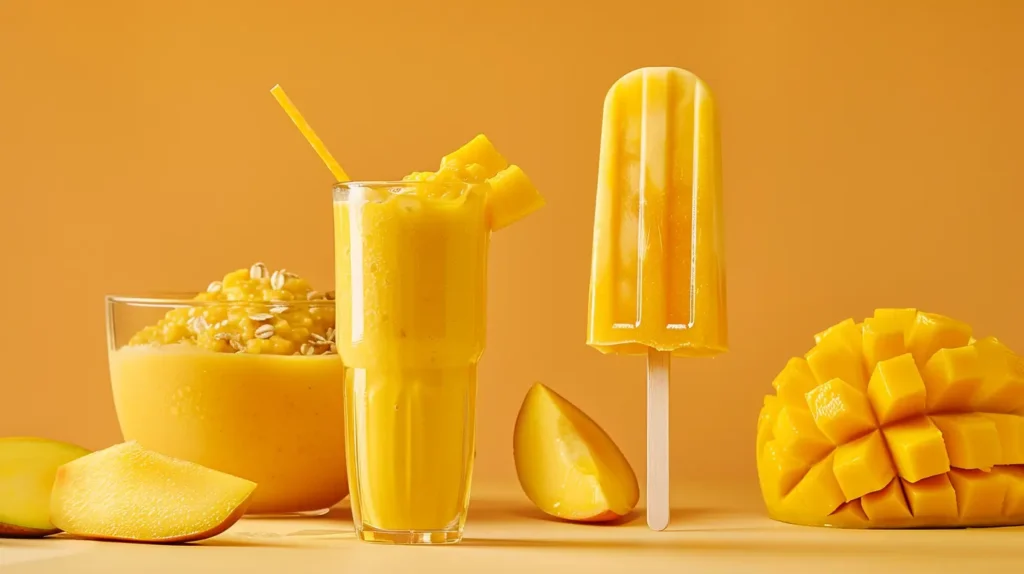Have you ever bitten into a juicy mango and wondered is mango good for weight loss? It might sound too good to be true, but this tropical fruit could be a secret weapon in your weight loss journey.
Picture this: You’re standing in the produce aisle, eyeing a perfectly ripe mango. Its vibrant yellow and red skin practically glows under the fluorescent lights. You can almost taste its sweet, tangy flavor. But a nagging voice in your head warns you about the sugar content. Should you put it in your cart or leave it behind?
In this article, we will find out what makes mango good for weight loss. We’ll explore the nutritional profile of mangoes and how they might fit into a healthy weight loss plan. We’ll dive into the potential benefits of mangoes for weight management, as well as some practical tips for incorporating them into your meals and snacks.
Nutritional Profile of Mangoes

To find out what makes mango good for weight loss, we need to find out about the nutritional profile of mangoes. Mangoes are not only delicious but also packed with essential nutrients that can support your health goals. A single cup (165 grams) of mango contains just 99 calories, making it a great choice for those watching their calorie intake.
Despite being low in calories, mangoes are an excellent source of vitamin C. Just one cup provides a whopping 67% of the daily value for this immune-boosting vitamin. Vitamin C is crucial for cell growth and repair, and it also helps your body absorb iron from plant-based sources.
Mangoes are also a good source of fiber, with one cup providing 2.6 grams or about 10% of the daily value. Fiber is important for digestive health and can help keep you feeling full and satisfied between meals.
In addition to vitamin C and fiber, mangoes contain a variety of other essential nutrients. One cup of mango provides:
| Nutrient | Amount per cup (165g) | % Daily Value |
|---|---|---|
| Copper | 0.2 mg | 20% |
| Folate | 71 mcg | 18% |
| Vitamin B6 | 0.2 mg | 12% |
| Vitamin A | 89 mcg | 10% |
| Vitamin E | 1.5 mg | 10% |
| Potassium | 277 mg | 6% |
Mangoes also contain smaller amounts of other vitamins and minerals, including vitamin K, niacin, riboflavin, magnesium, and thiamine.
It’s worth noting that while mangoes are relatively high in natural sugars, with one cup containing 22.5 grams, they have a low glycemic index. This means that the sugar is absorbed slowly into the bloodstream, which can help prevent rapid spikes in blood sugar levels.
The nutritional composition of mangoes may vary slightly depending on the variety and ripeness of the fruit. However, in general, mangoes are an incredibly nutrient-dense food that can be a delicious and healthy addition to your diet. Thus, making a mango good for weight loss.
Potential Benefits of Mangoes for Weight Loss

Mangoes may not be the first fruit that comes to mind when you think of weight loss, but they actually have several properties that could support your goals. One of the key benefits of mangoes is their low calorie density. This means that for the amount of calories they contain, mangoes are relatively filling and satisfying.
High Water and Fiber
A cup of mango chunks contains about 100 calories, but thanks to the fruit’s high water and fiber content, it can help you feel full and reduce your overall calorie intake. Fiber is especially important for weight loss because it slows down digestion, keeping you feeling satisfied for longer and reducing the urge to snack between meals.
Unique Phytochemicals
Another way mangoes may aid in weight loss is through their unique phytochemicals. Recent research has shown that mangoes contain compounds that can inhibit the development of fat cells and fat-related genes. While more studies are needed to fully understand this effect, it suggests that mangoes could play a role in preventing excess fat storage.
Mangiferin
Mangoes are also rich in antioxidants like mangiferin, which has been linked to various health benefits. Some studies have found that mangiferin may help improve metabolic health and reduce inflammation in the body. These effects could indirectly support weight loss efforts by promoting overall health and reducing the risk of obesity-related conditions.
It’s important to note that while a mangoes have potential weight loss benefits, they still contain natural sugars and should be consumed in moderation as part of a balanced diet. Aim for no more than one mango or one cup of mango per day, and be mindful of your total calorie intake from all sources.
When enjoyed in appropriate portions, mangoes can be a delicious and nutritious addition to a weight loss plan. Their sweet taste and creamy texture can help satisfy cravings for sugary snacks, while their fiber and nutrient content support healthy digestion and overall wellness.
What about Dried Mango?
What about Dried Mangoes? Is Dried Mango good for weight loss?
Dried mango does have some potential benefits for weight loss. It’s a good source of fiber, which can help you feel full and satisfied after eating, reducing the urge to snack on less healthy foods. Fiber also supports digestive health and regular bowel movements.
Dried mango also contains nutrients like vitamins A and C, as well as antioxidants that may support overall health. Some studies suggest that certain compounds in mangoes, like mangiferin, could even have anti-obesity effects.
However, it’s important to keep in mind that dried mango is more concentrated in calories and sugar than fresh mango. A 40-gram serving of dried mango contains around 130 calories and 30 grams of sugar. That’s because the drying process removes water, leaving behind a more condensed source of calories and sugar.
Choosing unsweetened varieties of dried mango can also help reduce added sugar consumption. Pairing dried mango with a source of protein, like nuts or yogurt, can help balance blood sugar levels and increase satiety.
What about Frozen Mango?
What about Frozen Mangoes? Is Frozen Mango good for weight loss?
One of the best things about frozen mango is that it retains most of the nutritional value of fresh mango. The freezing process helps preserve the fruit’s vitamins, minerals, and antioxidants, so you can still reap the benefits even when mangoes aren’t in season.
Frozen mango can be a great addition to a weight loss diet because it’s relatively low in calories but high in fiber. A one-cup serving of frozen mango chunks contains about 100 calories and 3 grams of fiber. The fiber content can help keep you feeling full and satisfied, which may reduce the urge to snack on less healthy options between meals.
Frozen mango is incredibly versatile and can be easily incorporated into a variety of weight-loss-friendly recipes. Blend frozen mango chunks into smoothies for a creamy and refreshing treat, or thaw and add them to yogurt, oatmeal, or salads for a burst of natural sweetness.
When choosing frozen mango, look for options without added sugars or syrups. Plain frozen mango should be the only ingredient listed on the package. As with any food, portion control is key when incorporating frozen mango into a weight loss plan. Stick to a one-cup serving and be mindful of how it fits into your overall daily calorie intake.
Fun Ideas to Add Mangoes to a Weight Loss Diet

Now that we know what makes mango good for weight loss, here are some fun ideas to add them to your weight loss diet. Mangoes are a delicious and versatile fruit that can easily be incorporated into any weight loss diet. The key is to enjoy them in moderation and pair them with other nutrient-dense, low-calorie foods.
Here are some fun and creative ways to add mangoes to your meals and snacks while staying on track with your weight loss goals.
Mango Smoothies
Mango smoothies are a refreshing and satisfying way to start your day or refuel after a workout. Blend mango chunks with low-fat yogurt, almond milk, or coconut water for a creamy and flavorful drink. You can also add spinach, kale, or avocado for an extra boost of nutrients and fiber.
Mango Salsa
Mango salsa is a zesty and colorful topping that can liven up any dish. Mix diced mango with chopped onion, cilantro, lime juice, and a pinch of chili powder. Serve it over grilled fish, chicken, or tofu for a protein-packed meal that’s bursting with flavor.
Mango Salad
Mango salad is a light and refreshing option for lunch or as a side dish. Toss sliced mango with mixed greens, cucumber, red onion, and a drizzle of balsamic vinaigrette. You can also add some crumbled feta cheese or toasted nuts for a satisfying crunch.
Mango Oatmeal
Mango oatmeal is a comforting and filling breakfast that will keep you energized all morning. Cook oats with low-fat milk or water, then stir in diced mango, cinnamon, and a touch of honey. You can also add some chia seeds or ground flaxseed for an extra dose of fiber and healthy fats.
Mango Ice Pops
Mango ice pops are a guilt-free treat that can satisfy your sweet tooth without derailing your diet. Blend mango chunks with a little water or coconut milk, then pour the mixture into ice pop molds and freeze until solid. You can also add a squeeze of lime juice or a sprinkle of chili powder for a spicy kick.
By getting creative with your mango recipes, you can enjoy the sweet and juicy flavor of this tropical fruit while still making progress towards your weight loss goals. Just remember to watch your portion sizes and balance your mango intake with plenty of other nutrient-rich foods like vegetables, lean proteins, and whole grains.
Today we answered the question: “Is Mango good for Weight Loss?”. Here are some other articles that you might like:
What are the Best Fruits to avoid for Weight Loss?
What are the Most Unhealthy Fruits?
Are Bananas good for Muscle Recovery?
Is Mango good for Weight Loss?
What are the Best Fruits for Muscle Gain?
What are the Best Vegetables to avoid for Weight Loss?



